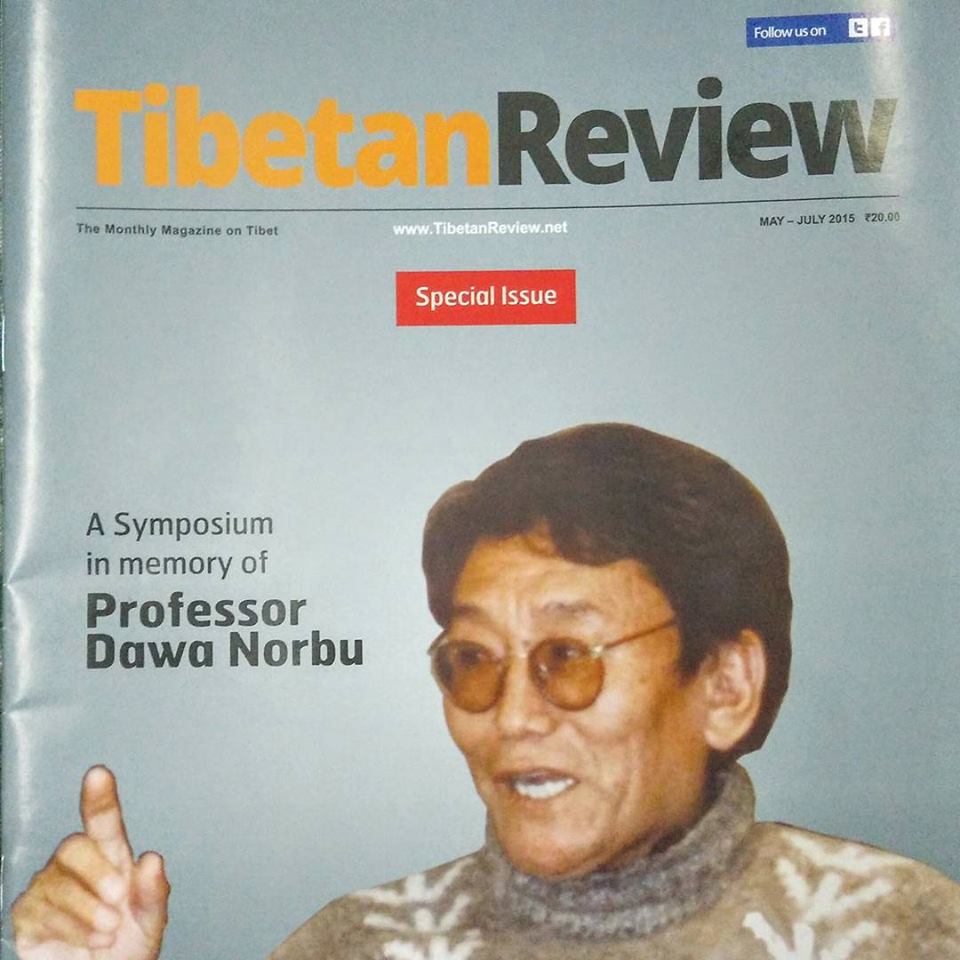TIBETAN REVIEW Special Issue: In Memory of Professor Dawa Norbu

One of the leading intellectuals of the Tibetan Diaspora, Professor Dawa Norbu passed away at age 58 on 28 May 2006.
He did his doctorate at the University of California, Berkeley and taught at the University of San Francisco State University. He worked as an editor of the Tibetan Review, a monthly journal, from 1972 to 1976 and later worked as a professor of Central Asian studies at the Jawaharlal Nehru University, New Delhi.
He is the author of acclaimed books like Red Star Over Tibet, Tibet: The Road Ahead, and China’s Tibet Policy.
This year, on April 7, Tibetan Review and Tibetan Forum of Jawaharlal Nehru University jointly organized a Symposium in memory of the late Professor.
Tibetan Review May-July issue, which is a Special issue in memory of Professor Dawa Norbu, contains all the presentations by the speakers at the Symposium. Here are some excerpts from the presentations:
Richen Jamyang Norbu, Son of Dawa Norbu
He was a man, they say, who was far ahead of his time. He was, in fact, perfectly in tune with the time. Only his fellow countrymen and women were unwilling to move with the time.
Sikyong Dr. Lobsang Sangay
Professor Dawa Norbu was a great intellectual and a pioneer in the world of Tibetan studies and no Tibetan has so far managed to attain his success and stature.
As the editor of Tibetan Review Professor Dawa Norbu was heavily criticized for being critical of the Central Tibetan Administration and the exile Tibetan leadership at the time. He felt that the Tibetan leadership in Dharamsala was more focused on spiritual matters and less on political matters, I believe. It was said that he had to run away from Dharamsala and I later heard the full version of that event from him.
At that time people went to His Holiness and complained to him about his writings. But the latter told them: “you should respect his views. This is the sort of Tibetan we want to see in the Tibetan world-Tibetans who can stand on their feet and criticize the community, criticize the leadership is what we want.”
Dr Yeshi Choedon, Associate Professor, Centre for International Politics, Organisation and Disarmament, JNU
During his lifetime there was not much acknowledgement of his contributions to Tibetan studies in general and Tibetan movement in particular. I am happy to hear the Tibetan establishment now acknowledging his contributions and appreciating his legacy. I would like to propose that the best tribute it can pay to his memory is to establish an award system for recognizing the best Tibetan studies done in India by Tibetan and Indian students below the age of 36. So I request the organizers of this conference to put up this proposal before the exile government.
Dr. Tenzin Dorjee, Associate Professor, Department of Human Communication Studies, California State University, Fullerton, U.S.A
When he visited Dharamsala for sojourn, Rinchen Lhamo la accompanied him and cooked for both of us. Richen Lhamo la loved him dearly and dedicated herself to his life and supporting his academic vision and work. Often she sat quietly in a corner of the room while Dawa Norbu-la single-pointedly involved in his writing at the desk. I would simply sneak in and out because Dawa la couldn’t interrupted while writing.”
Geshi Lhakdor, Director, Library of Tibetan Works and Archives(LTW), Dharamsala.
He was a wonderful example for the Tibetan youths for achieving academic excellence.
Prof. Priyadarsi Mukheri, Centre for Chinese and South-East Asian Studies, SLLCS, JNU
The name Dawa in Tibetan means ‘moon’, and Norbu means ‘jewel’. He indeed proved himself to be a jewel among the Tibetans.
He was an erudite scholar-a historian par excellence. Although he had come to India as a refugee but he did not have any refugee mentality. Dawa was not an overtly nationalistic character. He was rather rationalistic in his basic approach. He was indeed unlike his fellow Tibetans.
Madhuri Santanam Sondhi, Director, ML Sondhi Institute of Asia Pacific Affairs, New Delhi
Then one day we found him wandering around the JNU campus looking somewhat lost-Dawa as you may remember, absolutely fitted the moniker of the ‘absent-minded professor’. In his hand he was clutching an application form for the post of Associate Professor and anxiously looking for where to hand it in. It was probably the last day for submission of applications-and Professor Sondhi whisked him off, probably to the academic registrar and persuaded him to accept it although technically it might have been a little late, by about half an hour or so. Dawa got the job, and the rest, as they say is history.
Tibetan Review, established in 1968, is a monthly magazine of news and features on Tibet and Tibetans. If you want a copy of this Special issue, contact Tibetan Review

